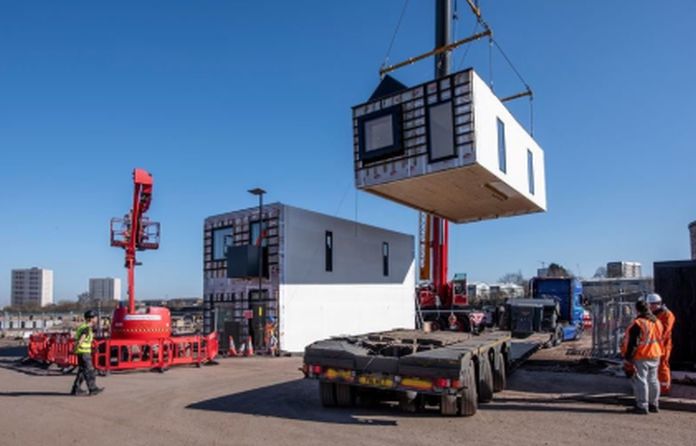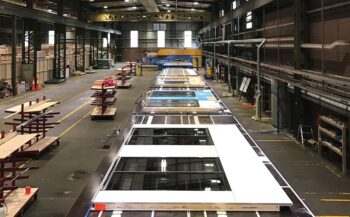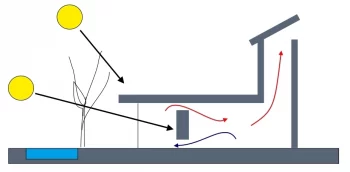Modern Methods of Construction (MMC)
‘Modern Methods of Construction’ (MMC) is a wide term, embracing a range of offsite manufacturing and onsite techniques that provide alternatives to traditional house building. MMC ranges from whole homes being constructed from factory-built volumetric modules to the use of innovative techniques for laying concrete blockwork onsite.
Since early in the 20th century, there have been previous periods of engagement with various alternative methods of construction in order to boost the country’s house-building output, most notably in the post-war period. With each iteration the new approaches have been linked with significant benefits; the speed of delivery, improved quality, reduced labour costs and predictability to name a few.
In recent years there has been renewed interest in MMC, with more developers engaging in project trials and going on to make increasing use of the variety of systems available. The 2017 Government White Paper 1 expressed support for the contribution MMC is expected to make to help solve the nation’s housing crisis and achieve the step-change in housing output that is needed. It pointed to the potential for a 30% improvement in the speed of construction of new homes through the adoption of innovation, with a potential 25% reduction in costs, as well as the potential for advances in improving quality and energy efficiency
UK Construction
The UK construction sector is a strategically significant part of the UK economy. Representing 8% of GDP and 9% of employment, every year £150 billion is invested through the public and private sectors. It is not only important in terms of its contribution to the economy, it is also an enabler of wider economic growth and development, providing the homes, infrastructure and environment that allows the nation to function and prosper.
The sector has been struggling, however, to meet the growing demand for its services in residential, with issues such as supply and demand imbalances which contribute to unaffordability and in extremis, homelessness. Market-led solutions alone have not met the needs of large segments of the population, as housing affordability has moved beyond the reach of so many. The construction sector for residential is part of the challenge. It is characterised by low productivity, variable quality, output lagging behind target, and slim margins for builders.
This is partly due to the cyclical nature of the residential trader model, creating unstable foundations for the construction sector to operate and invest in. Offsite manufacture represents an opportunity to address many of these issues in addition to increasing capacity and investment in the industry. Its properties and characteristics can supplement our existing capacities, supporting alternative models for delivery and allowing for more options to be considered when tackling the complicated process of housebuilding.
Buildoffsite
The Buildoffsite Property Assurance Scheme (BOPAS) accreditation of non-traditional build, was one of the first systematic attempts to help mainstream MMC. This offered durability and maintenance assessment carried out by Building Life Plans Ltd (BLP), process accreditation carried out by Lloyds Register, and a web-enabled database providing valuers, lenders and surveyors with details of housing units by the scheme.
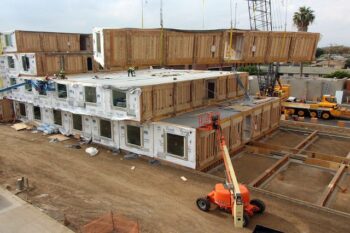
Launched in 2013, having been jointly developed by Buildoffsite, RICS, Lloyd’s Register and BLP Insurance, in consultation with the Council of Mortgage Lenders (now integrated into UK Finance) and the Building Societies Association (BSA), the scheme seeks to address confidence issues with MMC.
Drivers of change
A combination of acute housing demand and market failures in terms of cost, quantity and quality, are forcing the industry and government to look at MMC as a solution. This has culminated in Government’s including MMC in major housing strategy announcements, recognising that it has the potential to speed up delivery, improve productivity and modernise the sector.
The reason for such faith being placed on MMC can be attributed to three key elements reflecting the three principles driving the sector deal:
Digitising – Delivering better, more certain outcomes using digital technologies
Manufacturing – Improving productivity, quality and safety by increasing the use of manufacturing;
Performance – Optimising whole life performance through the development of energy-efficient, smart assets.
Digitisation may be deployed both in the production process to achieve precision assembly and also provided:
Ideas – investment in the development of digital and manufacturing-based approaches to construction
People – reforming industry recruitment and training to attract, retain and develop the skills that the industry needs
Infrastructure – taking forward the investment set out in the National Infrastructure and Construction Pipeline
Business environment – developing a sustainable business model for construction and establishing the UK as a global leader in infrastructure delivery
Places – working across the sector to strengthen the supply chain and skills base across the UK.
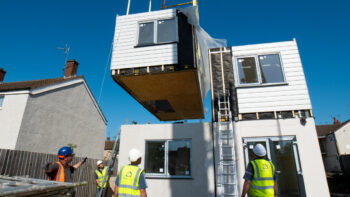
Barriers to change
Given the stated advantages, MMC can become much more prominent in the sector. However, there are obstacles to overcome before MMC becomes mainstream.
Supply chain
The supply chains for many MMC technologies have yet to develop to a point at which we can meet the ambitions for the sector. Demand fluctuations, unstable investment and construction cycles, and a fragmented housing market procurement model is not obviously a good fit with factory production. Nevertheless, as demonstrated in the paper, some offsite products and processes have had greater longevity, and have achieved significant penetration in the conventional housebuilder supply chain.
Skills
The skills issue in the construction sector can also impact the development of offsite. Assuming that there are no skills or labour supply problems at the factory end, there will still be the requirement for the substructure, superstructure and finishing trades on-site, as well as issues around utilities. Moreover, as MMC strategies are tied into digitisation, IT literacy amongst construction workers will be a concern. Given the recent pattern of concentration and fragmentation in the sector, high levels of investment in training and education will be required.
Cost and data
From a cost, value and performance perspective, modern offsite construction is relatively untested and is still in an evolutionary phase. The data on the cost of construction, value and performance using offsite is not robust yet, and as techniques evolve, cost information and performance change, and previous data becomes obsolete. This makes it hard for the industry to estimate costs, assess benefits and plan appropriately, which is a challenge for surveyors in particular.
Changing work profile and inflexibility
As the objective is for up to 70% of the cost to be incurred offsite in factories and at the design phase, the points at which labour is most intensively used throughout a project differs from the traditional build, with the cost curve far more front-loaded. This cost profile demands a ‘right first time’ – from initiation.
Industry familiarity
Lack of familiarity with different offsite construction techniques can lead to risk-averse decisions against its use. This is reinforced by the subcontracting model and informal networks.
Consumer perception
There is still consumer resistance, with an abiding image of post-war emergency housing rather than 21st Century technology delivering better quality, safer, and far more cost-effective homes at the same or, with upscaling, at a lower cost.
Standardisation and scalability
Standardisation of different technologies is also critical to reducing complexity and achieving scalability. There needs to be a sense that consumers have a choice between contractors when choosing a technology, although conventionally there will be a natural selection of technologies leaving a handful in the mainstream.
Modular Construction and beyond
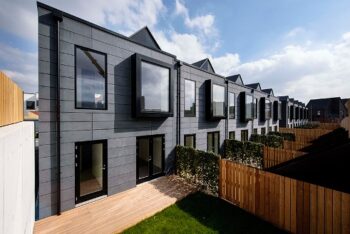
Offsite construction has been heralded as the solution to the UK’s housing crisis – a quick and efficient method of constructing residential accommodation to meet an ever-growing demand. Modular construction in particular is seen as a fast and efficient method of construction, allowing quick builds, and trades to work in parallel, to ensure a building is erected at its intended site in the least time possible, causing minimal disruption.
Accreditation:
Modern-methods-of-construction – RICS
Modern-methods-of-construction – Cast Consultancy
Modern-methods-of-construction – NHBC Foundations
Visited 384 Times, 1 Visit today
